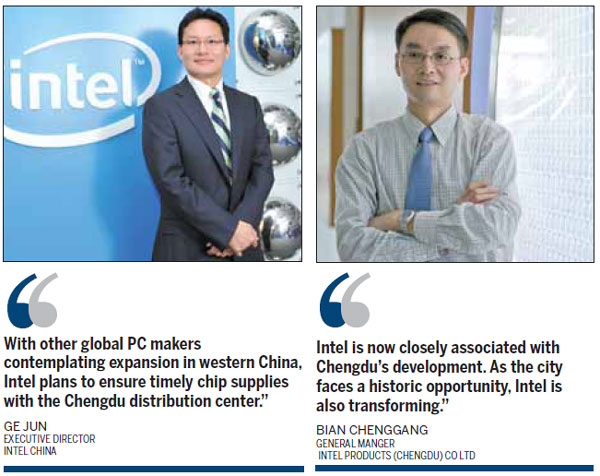Heated debate, but Intel gamble pays big rewards

"Chengdu can do" is the phrase Intel uses to describe its development in the capital city of Southwest China's Sichuan province over the past decade.
In 2003, after three years of negotiation and preparations, the global IT giant announced its decision to build a $375 million chip assembly and testing plant in Chengdu.
It then made additional investments in 2005, 2006 and 2009, bringing Intel's total investment in the city to $600 million.
At the time, the initial decision to locate in Chengdu caused heated debate among Intel's top management. Some were not sure if a city in western China would prove a good choice.
"Now no one argues about it. What is discussed most is by what amount Intel should increase its investment here," Bian Chenggang, general manger of Intel Products (Chengdu) Co Ltd, told the media.
In the past 10 years, Intel's facility has grown into the largest of its five global chip assembly and testing centers and also one of its three largest wafer pretreatment plants in the world.
Intel has more than 90 percent of the global mobile processor market, with chips made in Chengdu accounting for more than 50 percent of the total.
"Now one of every two laptops in the world is configured with a chip manufactured by Intel's Chengdu facility," said Gu Yi, Intel's public affairs director for western China.
"And we won the Intel Quality Award last year, a sign recognition from of the headquarters of the Chengdu facility's work. To be frank, back in 2003 nobody would have predicted what we have achieved today," she added.
In January 2012, the Chengdu facility rolled out its 1 billionth chip. In the same month, Intel announced it would set up a distribution center in Chengdu, its third in China after Shanghai and Shenzhen.
The main reason for the move is the surging need for microprocessors in western China, Ge Jun, executive director of Intel China, said in a recent interview.
"With other global PC makers contemplating expansion in western China, Intel plans to ensure timely chip supplies with the Chengdu distribution center," Ge said.
He said the new center will shorten response times to customers in western China and ensure they get the latest Intel products and technologies.
With the distribution center in place, Lenovo, Dell and Flextronics International plants in Chengdu can receive Intel's chips as soon as possible, as can HP and Acer facilities in Chongqing, said Gu.
An official of the Chengdu Economic and Information Committee said the Intel facility also attracted many downstream suppliers that set up operations in the city and helped create a high-tech industrial cluster.
He believes that the Intel distribution center in Chengdu will not only help facilitate the development of the logistics industry, but also provide strong support for Sichuan to capitalize on the central government's go-west strategy.
"Intel is now closely associated with Chengdu's development. As now the city is facing a historic opportunity, Intel is also transforming," Bian said.
In 2013, Intel will gradually shift its focus to cloud computing as well as chips for mobile phones and Ultrabooks. The Chengdu facility will take the lead in the process, Bian added.
"In the following two to three years, more and more Intel products will make their world premieres in Chengdu," he said.
lifusheng@chinadaily.com.cn


















